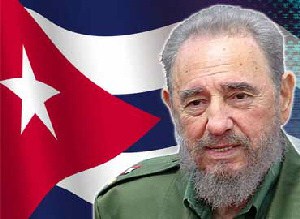CARICOM Chairman says Caribbean-Cuba Summit “very successful”
PORT OF SPAIN, Trinidad – Caribbean Community (CARICOM) and Cuba leaders ended their summit in Trinidad and Tobago on Thursday night describing the deliberations as “very successful.”
CARICOM Chairman and Prime Minister of St. Kitts and Nevis, the Right Hon. Dr. Denzil L. Douglas told an end of summit news conference that CARICOM had expressed its gratitude to Havana over its assistance in various areas including health and education.
But he said the regional leaders had expressed to their Cuban counterpart, the need for a Havana to “ease the restrictions” that would allow for CARICOM nationals to travel to Cuba for medical treatment.
“At a time when there is so much challenge from the global economic situation…here is a relatively small country still extending its hand of friendship in a number of critical areas,” he told reporters.
Dr. Douglas said that Cuba has also offered to assist the region deal with the small arms trade adding that Cuba’s President His Excellency Raul Castro, who attended the talks in Port of Spain “was willing to ensure that we learn from their experiences”.
The “Declaration of Port of Spain” issued after the summit, noted with “deep concern the continued threats posed by the illegal trade in narcotics and small arms and light weapons, the growing phenomenon of trafficking in persons and the consequent impact that these phenomena have on development efforts and social welfare of the people of the region.”
They have pledged to “cooperate in the international struggle against these phenomena in accordance with the purposes and principles of the Charter of the United Nations as well as other principles adopted by the UN General Assembly and contained in the provisions of the international conventions and agreements to guide cooperation in this matter.
“We therefore pledge to take all necessary measures to ensure full compliance with the 2001 Programme of Action to Combat and Eradicate the illicit Trade in Small Arms and Light Weapons, including through the development and implementation of national action plans to combat the illicit trade in small arms and light weapons.
“To this end we look forward to the convening of the 2012 Review Conference on the UN Programme of Action which will seek to further strengthen the Instrument with a view to buttressing our efforts to combat this scourge.”
The leaders said that despite their “strongest commitment” to fight the illegal drugs and arms trade, their efforts are being “frustrated by the increasing demand of illegal drugs in major consuming countries and by the failure in those countries to also control the supply of small arms and light weapons”.
The declaration also noted that the countries have renewed their commitment to “south-south cooperation and regional cooperation specifically as one of the central strategies for confronting the challenges to the sustainable development and welfare of our peoples posed by the volatility of the current international environment particularly in the areas of food security, nutrition and energy”
They have also re-affirmed their ‘strong rejection of the unjust and cruel economic, commercial and financial embargo against the Republic of Cuba and the extraterritorial measures aimed at extending the reach of the embargo to include third countries”.
The CARICOM and Cuban leaders say they also view the lack of “real progress in the conclusion of the Doha Development Agenda and the attendant challenges faced by developing countries of the Caribbean in their efforts to participate fully and effectively in the process geared to the establishment of a rules-based fair trading system which takes full account of their special development needs”.

Trinidad and Tobago Prime Minister Hon. Kamla Persad-Bissessar (right) and President of Cuba His Excellency Raul Castro (center) exchange greetings during the opening ceremony of the Caricom Cuba Summit at the National Academy for the Performing Arts, Port-of-Spain. At left is Prime Minister of St Kitts and Nevis and chairman of Caricom, the Right Hon. Dr. Denzil L. Douglas.
Photo: Shirley Bahadur
Regarding climate change, the CARICOM and Cuban leaders have reaffirmed their support for the United Nations Framework Convention on Climate Change (UNFCC) as the primary intergovernmental forum for negotiating the global response to the issue of climate change.
But they said that “an appropriate response to this challenge should address mainly the roots of the problem and not only the consequences, as well as respect the principles of the Convention, in particular the principle of common but differentiated responsibilities and the states respective capacities.
“In this sense, underline the importance of mitigation as part of a balanced and ambitious outcome of international negotiations on climate change, including a decision on establishing the second commitment period under the Kyoto Protocol.”
They said they were also looking towards a favourable outcome of the UN Conference on Sustainable Development Rio+20 to be held in Brazil in June next year and urged the international community to “fully address the special development concerns of low lying coastal and Small Islands Developing States” at the conference.
The leaders have also warned that the global financial and economic crisis “:is not over” and that recovery is “uneven and uncertain” and have reiterated that “the systematic problems facing the global economy have to be resolved, including through the full accomplishment of a fundamental reform of the global financial system and architecture”.
The summit also rejected recent comments by French President Nicolas Sarkozy’s characterisation of three regional countries as “tax havens.”
“This indiscriminate characterization was at variance with the spirit conveyed in the Official Declaration of the G20, which had applauded the efforts made by the CARICOM states identified to ensure that their legal and regulatory framework was in compliance with the global standard.
“It has had the further effect of undermining access to banking and finance as well as the competitive advantage of Caribbean countries in the area of financial services,” the Declaration added.
The next summit, which is held every three years, will take place in Havana.


